 |
 20th September 1998 |
Front Page| |
 Spirit of peace and pioneers |
Contents
|
|
 |
Taste of our own medicineWhile many potent chemicals extracted from local herbs used in ayurvedic formulas are being patented abroad, is Sri Lanka losing a valuable resource. Tharuka Dissanaike and Dilrukshi Handunetti report: Last Friday a 14 mem- ber Ministerial Com mittee sat, attempting for the first time to formulate a plan to protect traditional knowledge and plants of the country. Their aim is to come up with a definite set of regulations that will prevent foreigners from patenting indigenous medicinal plants or traditional Ayurvedic knowledge. The Committee will look at the difficult issue of intellectual property rights with regard to traditional or ayurvedic knowledge and what could be done to address the problem of foreign companies patenting local plant extracts. The need for such a committee and action plan was strongly felt when the Customs Department recently apprehended a consignment of four metric tonnes of a herb–Kothalahimbutu (used in ayurvedic medicine) to Japan. "We are trying to formulate a plan to combat this problem," said Gunerathna Silva of the Ministry of Health and Indigenous Medicine who also leads the IUCN- World Conservation Union assisted programme "Medicinal Plants Conservation Project." "Within the next 12 months the project is expected to prepare guidelines for the protection of traditional knowledge and medicinal plants."
The West, meanwhile, has discovered the so-called scientific side of Ayurveda and capitalised on this knowledge and the market swing towards herbal medicines. All along, Western countries have been manufacturing an array of pharmaceutical products using Asian plant produce, with the source countries not even receiving the crumbs of their multi-million dollar profits. It is a growing industry with scientists experimenting to combat the numerous ailments plaguing the world-and cures not yet found. Salacil Reticulata or Kothalahimbutu is fast becoming popular as a means of diabetes control. While Sri Lankan Ayurvedic exponents evolved a cottage industry of hand carved Kothalahimbutu mugs and jugs, the pharmaceutically -advanced countries moved fast to take the patent rights for Salacinol. Many of the plants whose extracts have been patented by developed countries only grow in the South East Asian tropics. Kothalahimbutu, for example, is a sub species of Himbutu, a plant confined to some parts of India and Sri Lanka. Ayurvedic Medicine advises that a person suffering from diabetes drinks water left overnight in a mug carved out of kothalahimbutu wood. Earlier, Japanese researchers managed to isolate Salacinol from this plant which is described as a potent glucose inhibitor. Last year a Japanese company patented Salacinol through the American Chemical Society. Meanwhile, Jintang, another Japanese Company has begun manufacturing and world wide distribution of a diabetic arresting tablet. In this manner 25 other plant extracts have been patented abroad. The issue did not receive attention even when the University of Sri Jayawardenapura entered into a contract with the Cornel University of the United States to legally export 905 plant varieties until the year 2005. The eye opener was when a group of Customs officials led by Samantha Gunasekera cracked down on a BOI approved company exporting 4114 kilo grams, 1512 cups (carved out of the wood) of Kothalahimbutu in raw form to Japan a month ago. According to Samantha Gunasekera who led the investigation, this was not the first instance, nor would it be the last. According to a leading environmental investigator and a researcher, environmentalists have appealed to authorities to formulate stringent laws to curb this trend. Acting Registrar of Trademarks and Patents, P.D.D.K Perera, clarifying the issue of patenting traditional medicinal extracts abroad said that a plant itself cannot be patented. The product made of that plant or the process of extraction can be patented if it is a new invention. According to environmental lawyer Jagath Gunawardene, a patent is given once three components are addressed.- the product has to be a new, it has to be a product or a manufactured product specifying the process, and it must necessarily have commercial value. If there are discrepancies in the above, an order to quash the patent could be sought. Illustrating the above point, he said that a land mark case in India decided the matter in favour of India when an American company's patent rights' registration was challenged on the grounds of not being a new formula. In 1985, the patent for pharmaceuticals produced out of Weniwelgata and Bebila were extended by an American company. The pharmaceuticals have been patented as products from the 'alcoholic extract of the relevant plants." Gunawardene is of the view that the patent right as in the illustrations given have been exploited by commercial ventures to wield exclusive producing power and trade monopolies. Environmentalist, Prasantha Jayasekera suggests that the state should take control of the entire biological diversity of the country. He said that this will prevent foreign companies patenting products turned out of our medicinal herbs where Sri Lanka does not earn a red cent out of it. "There is no royalty payment for what is ours by right," he said. Jayasekera recommends that a Bio Diversity Authority be set up to control such activity. The tragedy is that, in the end, the very medicines that are produced using extracts from local plants are sold back to us at exorbitant prices. And if some day we decide to manufacture our own pharmaceuticals using plant extracts patented elsewhere, our right to do so stands firmly restricted by the companies who gathered our ground produce for a few rupees.
Patent"A patent is a powerful exclusive right granted for a period of 20 years. It is a document with legal, scientific and commercial value. The exclusive commercial right to manufacture a particular product is given for a period of 20 years, though there have been instances when companies have extended the patent for their commercial benefit. However, extension of patents is permissible for pharmaceutical products only. All others lapse after the specified number of years." - Jagath Gunawardene, Environmental Lawyer.
'Attempt to steal our wealth'Victor Hettigoda of Siddhalepa fame told The Sunday Times that the government must intervene quickly to stop this "business of foreigners patenting our plants." "The President should advise all our Ambassadors in other countries to let the patenting bodies know that this problem exists. That way we might prevent drugs derived from our plants come from being patented abroad," Hettigoda said. Hettigoda has patented his ayurvedic cure-all balm Siddhalepa and toothpaste, Supirivicki. "If I am to formulate a diabetic solution now using kothaºlahimbutu and export it to Japan, I might get in trouble with the authorities there," Hettigoda said, adding that this is a calculated attempt to steal what is our wealth.
Patented!Nutmeg, Kalu duru, Heenebila,Walangasal, Masakka, Godakaduru, Weniwelgeta, Kathurupila and Karandamungu.-all patented by the Nissan Tsurui Yakuhin pharmaceutical company of Japan. In addition, Ekaveriya, Ran Netol, Kohomba, Bin Kohomba, Badura, Katu karosana, Thipal, Aralu, Bulu, Nelli, Binara, Bim- pol, Heen Aratta, Gotu Kola and now Kothalahimbutu.
More Plus * The right royal tour
Front Page| News/Comment| Editorial/Opinion| Business| Sports | Mirror Magazine |
|
 |
Please send your comments and suggestions on this web site to |
|
 It
is no surprise that our plants and extracts have often been exported to
countries who have sophisticated equipment that can isolate the potent
chemicals with curative powers from these plants. While our traditional
physicians knew of these curative powers they could do little to scientifically
analyse the ingredients that go into a formula.
It
is no surprise that our plants and extracts have often been exported to
countries who have sophisticated equipment that can isolate the potent
chemicals with curative powers from these plants. While our traditional
physicians knew of these curative powers they could do little to scientifically
analyse the ingredients that go into a formula.